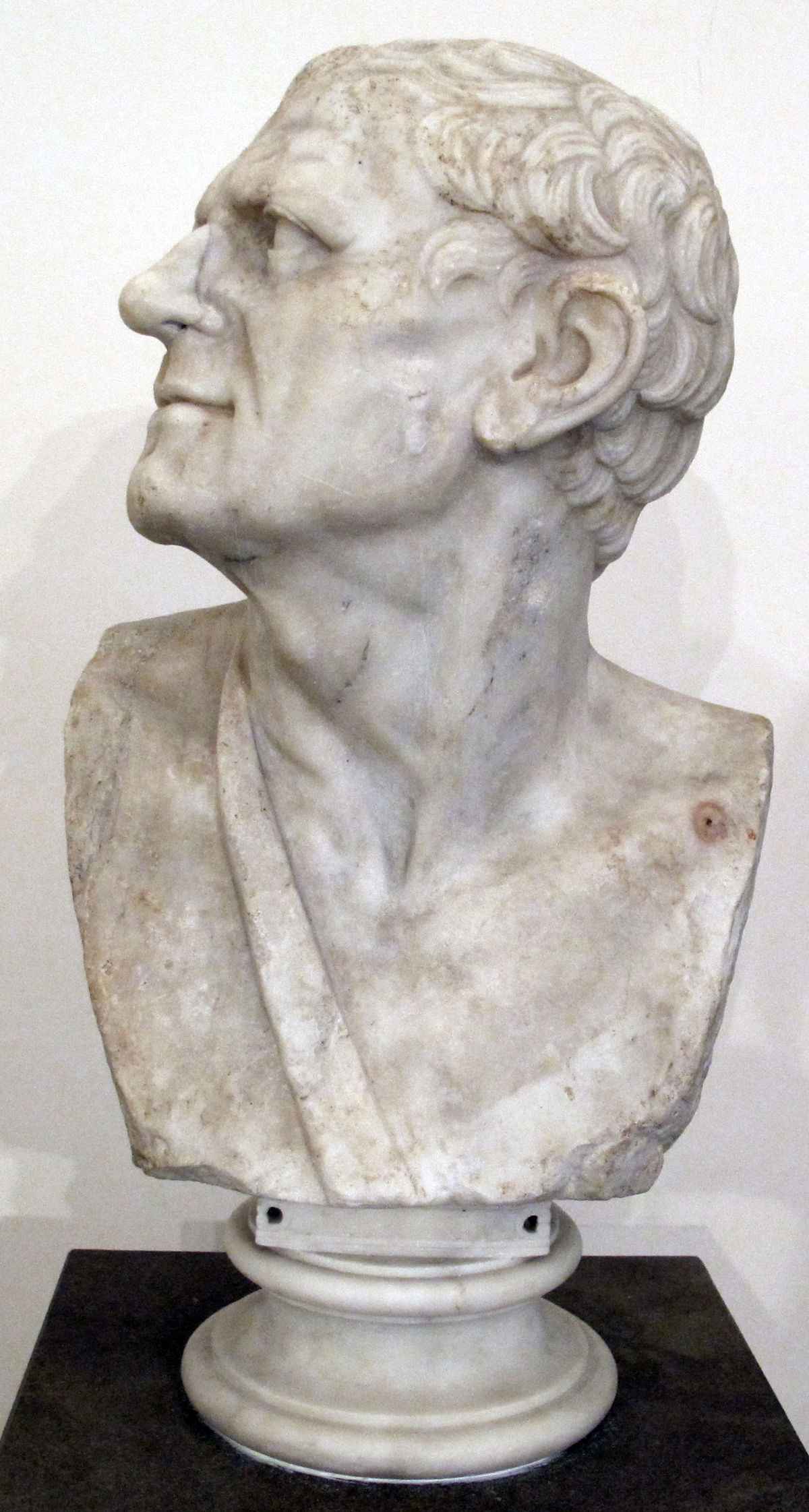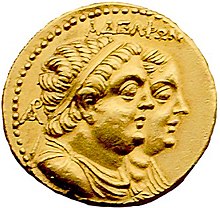To start off, Arsinoe is pronounced ar-SIN-o-ay. The only reason I bring this up, is because I recently discovered that I've been pronouncing it wrong for years. What can I say? I read way too many books, and don't talk to nearly enough people.
Born 316 BCE, Arsinoe, later known as Arsinoe Philadelphus, was wife to three kings. She has gone down in history as a schemer. She's been accused of vile crimes, such as propositioning her husband's son, ordering the banishment of her husband's other wives, and ordering the execution of men who threatened her son's places in the line of succession. The truth is much more tame, and reveals not a black-hearted schemer, but a talented and ambitious woman who wanted to see her sons on the throne of Egypt.
Arsinoe was the daughter of Ptolemy I Soter and his second wife, Berenice I. Not much is known about her early life, as she doesn't make much of an appearance in historical record until 299-- the year of her marriage to the 60 year old Lysimachus, king of Thrace, Anatolia, and Macedonia.
Lysimachus, like Arsinoe's father Ptolemy, was one of the heirs to the vast empire of Alexander the Great. Unlike Ptolemy, Lysimachus was having a little trouble keeping his kingdom under control. It was hoped that his marriage to Arsinoe would not only establish good relations between the two kingdoms, but help bring stability to Lysimachus' lands.
Lysimachus must have liked the 17 year old Arsinoe, because they had three children in rapid succession, Ptolemy in 297, Lysimachus Jr.¹ in 294, and Philip in 293. He renamed the city of Ephesus after her, and gave her at least three cities from around his empire. Though Lysimachus had other wives (polygamy was IN for Hellenic monarchs), Arsinoe was a clear favorite, especially after her full-brother (meaning same mother, same father. Keep this in mind, it'll be important later) Ptolemy II ascended the throne of Egypt.
For 17 years Arsinoe had a relatively quiet life. She enjoyed her time as the second most prominent person at court (after her husband), built religious buildings, and took care of the cities under her command. Unfortunately, as the 280 BCE's came on, she began to clash with Agathocles, Lysimachus' eldest son and heir apparent.
Now, it is important to note that the idea of primogeniture, and the eldest son of the first wife inheriting the father's title and position hadn't come around yet. During this time, King's chose their heir based off ability to rule, and while Agathocles, being Lysimachus' only adult son, was most likely going to inherit the throne and kingdom, it wasn't a sure thing, especially since Arsinoe's sons were nearing majority.
Tradition has it that around 283 Arsinoe propositioned Agathocles, who was only a few years older than her. Agathocles turned her down, and, incensed, Arsinoe convinced Lysimachus to execute his eldest son. This is very likely untrue. Agathocles was a full grown man, and could have expected to share in the duties (and perks) of kingship, but Lysimachus was stubbornly clinging on to his throne. Discontented, Agathocles had begun to plot against his father, and Lysimachus ordered his son's execution.
Enter Lysandra, Arsinoe's half sister, Agathocles' widow, and political schemer out for revenge. She had fled to Babylon with her brother Ptolemy Ceraunus, and was pouring ideas into the ear of King Seleucus, one of Lysimachus' main rivals.
Seleucus was king of what is modern Syria and Iran, and he wanted into Anatolia. Lysandra and Ptolemy C. convinced him to invade in Agathocles' name, and claim the country for himself. Seleucus happily complied, and with Ptolemy C. in the lead, invaded Lysimachus' European holdings. Lysimachus died in the chaos, and Ptolemy C. personally assassinated Seleucus, taking Lysimachus' kingdom for himself.
Arsinoe had fled with her sons to the city of Cassandrea. Located in modern Greece, the city had strong walls which Arsinoe kept manned by soldiers loyal to her. She was safely ensconced when Ptolemy C's emissaries came courting on his behalf.
Ptolemy Ceraunus was the son of Ptolemy I, and Arsinoe's half brother. He'd been passed over as king of Egypt in favor of his brother, and had fled abroad to make trouble. He'd been living in Lysimachus' court since 285, and recognized Arsinoe's political power. As the wife of the former king, she exerted significant pull with the government, and she was well loved by the common people for her piety. Throw in her Egyptian contacts, and Arsinoe was an ideal bride. Though they'd been mortal enemies weeks before, Ptolemy C. was ready to propose.
It is difficult to say what Arsinoe was thinking when she accepted his proposal. Ptolemy C. was well known for being someone who could not be trusted, and he'd contributed significantly to the death of Arsinoe's late husband. Arsinoe took every precaution--she insisted on a very public marriage ceremony, she made Ptolemy C. adopt her sons as his heirs--but the union still unsettled most people. Arsinoe's son Ptolemy was so against the union that he left before the wedding ceremony, a move which saved his life. Shortly after their marriage, Ptolemy C. had Arsinoe's younger sons killed, and Arsinoe fled to Egypt.
Ptolemy II, also known as Ptolemy Philadelphus (from here out, Ptolemy P.) was king of Egypt, and Arsinoe's full brother. He was already married (to a woman named Arsinoe, incidentally) with several sons when his sister returned to the land of her birth. Ptolemy P. welcomed his sister with welcome arms. She was well known for her political savvy, and she was ready to put that to work in Egypt. Unfortunately, this put Arsinoe II at odds with Arsinoe I. This eventually led to Ptolemy P. banishing his wife, and marrying his sister, making her co-pharaoh.
A marriage between full siblings didn't sit super well with the ancient Greeks, though it didn't seem to bother the Egyptians too much. However, Ptolemy P. and Arsinoe quashed objections to their marriage by associating themselves with Zeus and Hera, Osiris and Isis, two other pairs of married siblings, and the monarchs of their respective spheres. This association with deity would lead to Arsinoe being worshiped as a goddess both during and after her life.
Arsinoe adopted Ptolemy P.'s sons by Arsinoe I, putting an end to her dreams of her remaining son taking a throne. However, Arsinoe was just as much the pharaoh as Ptolemy P. She inspected troops, led the state cult, and appeared on the coinage, sometimes alone. She was widely venerated, especially in the countryside by the common people. Unfortunately, she died just five years after arriving in Egypt.
We remember Arsinoe today because of her masterful political maneuvering. She wasn't noted for her charitable works like similar schemers, but rather for her swift rises to power. She became the favorite wife of two men who already had wives, and prompted the banishment of her enemies. It is impossible to say if Arsinoe did all this maliciously, but it is certain that she must have had a forceful personality. Though she drew significant criticism after her death, both for the disappearances of her enemies and marrying her brothers (though it is important to note that no children came of the union of Arsinoe and Ptolemy P.) she was an important, and valued politician of her time.
¹Not his actual historical designation.
Sources
Arsinoe II Philadelphus
Arsinoe II, Queen of Thrace and Egypt
Arsinoe II
A Portrait of Arsinoe Philadelphos by Dorothy Burr Thompson
 |
| Bust of Arsinoe made in Alexandria. Though she was often portrayed in the Egyptian style, this sculture has a distinctive Hellenic influence. |
Arsinoe was the daughter of Ptolemy I Soter and his second wife, Berenice I. Not much is known about her early life, as she doesn't make much of an appearance in historical record until 299-- the year of her marriage to the 60 year old Lysimachus, king of Thrace, Anatolia, and Macedonia.
Lysimachus, like Arsinoe's father Ptolemy, was one of the heirs to the vast empire of Alexander the Great. Unlike Ptolemy, Lysimachus was having a little trouble keeping his kingdom under control. It was hoped that his marriage to Arsinoe would not only establish good relations between the two kingdoms, but help bring stability to Lysimachus' lands.
Lysimachus must have liked the 17 year old Arsinoe, because they had three children in rapid succession, Ptolemy in 297, Lysimachus Jr.¹ in 294, and Philip in 293. He renamed the city of Ephesus after her, and gave her at least three cities from around his empire. Though Lysimachus had other wives (polygamy was IN for Hellenic monarchs), Arsinoe was a clear favorite, especially after her full-brother (meaning same mother, same father. Keep this in mind, it'll be important later) Ptolemy II ascended the throne of Egypt.
 |
| Lysimachus, Arsinoe's first husband. |
Now, it is important to note that the idea of primogeniture, and the eldest son of the first wife inheriting the father's title and position hadn't come around yet. During this time, King's chose their heir based off ability to rule, and while Agathocles, being Lysimachus' only adult son, was most likely going to inherit the throne and kingdom, it wasn't a sure thing, especially since Arsinoe's sons were nearing majority.
Tradition has it that around 283 Arsinoe propositioned Agathocles, who was only a few years older than her. Agathocles turned her down, and, incensed, Arsinoe convinced Lysimachus to execute his eldest son. This is very likely untrue. Agathocles was a full grown man, and could have expected to share in the duties (and perks) of kingship, but Lysimachus was stubbornly clinging on to his throne. Discontented, Agathocles had begun to plot against his father, and Lysimachus ordered his son's execution.
Enter Lysandra, Arsinoe's half sister, Agathocles' widow, and political schemer out for revenge. She had fled to Babylon with her brother Ptolemy Ceraunus, and was pouring ideas into the ear of King Seleucus, one of Lysimachus' main rivals.
Seleucus was king of what is modern Syria and Iran, and he wanted into Anatolia. Lysandra and Ptolemy C. convinced him to invade in Agathocles' name, and claim the country for himself. Seleucus happily complied, and with Ptolemy C. in the lead, invaded Lysimachus' European holdings. Lysimachus died in the chaos, and Ptolemy C. personally assassinated Seleucus, taking Lysimachus' kingdom for himself.
 |
Ruins at the city of Ephesus. The city was renamed Arsinoea
by Lysimachus, but the name was changed back to Ephesus
after his death.
|
Ptolemy Ceraunus was the son of Ptolemy I, and Arsinoe's half brother. He'd been passed over as king of Egypt in favor of his brother, and had fled abroad to make trouble. He'd been living in Lysimachus' court since 285, and recognized Arsinoe's political power. As the wife of the former king, she exerted significant pull with the government, and she was well loved by the common people for her piety. Throw in her Egyptian contacts, and Arsinoe was an ideal bride. Though they'd been mortal enemies weeks before, Ptolemy C. was ready to propose.
It is difficult to say what Arsinoe was thinking when she accepted his proposal. Ptolemy C. was well known for being someone who could not be trusted, and he'd contributed significantly to the death of Arsinoe's late husband. Arsinoe took every precaution--she insisted on a very public marriage ceremony, she made Ptolemy C. adopt her sons as his heirs--but the union still unsettled most people. Arsinoe's son Ptolemy was so against the union that he left before the wedding ceremony, a move which saved his life. Shortly after their marriage, Ptolemy C. had Arsinoe's younger sons killed, and Arsinoe fled to Egypt.
Ptolemy II, also known as Ptolemy Philadelphus (from here out, Ptolemy P.) was king of Egypt, and Arsinoe's full brother. He was already married (to a woman named Arsinoe, incidentally) with several sons when his sister returned to the land of her birth. Ptolemy P. welcomed his sister with welcome arms. She was well known for her political savvy, and she was ready to put that to work in Egypt. Unfortunately, this put Arsinoe II at odds with Arsinoe I. This eventually led to Ptolemy P. banishing his wife, and marrying his sister, making her co-pharaoh.
 |
| Arsinoe II and Ptolemy P. on a coin. |
Arsinoe adopted Ptolemy P.'s sons by Arsinoe I, putting an end to her dreams of her remaining son taking a throne. However, Arsinoe was just as much the pharaoh as Ptolemy P. She inspected troops, led the state cult, and appeared on the coinage, sometimes alone. She was widely venerated, especially in the countryside by the common people. Unfortunately, she died just five years after arriving in Egypt.
We remember Arsinoe today because of her masterful political maneuvering. She wasn't noted for her charitable works like similar schemers, but rather for her swift rises to power. She became the favorite wife of two men who already had wives, and prompted the banishment of her enemies. It is impossible to say if Arsinoe did all this maliciously, but it is certain that she must have had a forceful personality. Though she drew significant criticism after her death, both for the disappearances of her enemies and marrying her brothers (though it is important to note that no children came of the union of Arsinoe and Ptolemy P.) she was an important, and valued politician of her time.
¹Not his actual historical designation.
Arsinoe II Philadelphus
Arsinoe II, Queen of Thrace and Egypt
Arsinoe II
A Portrait of Arsinoe Philadelphos by Dorothy Burr Thompson

No comments:
Post a Comment
Thank you so much for commenting! We have turned on comment moderation in order to cut down on the amount of spam and promotional material being sent to us. Provided your comment is not attempting to sell something, your comment will be published within the next 48 hours.